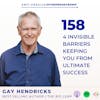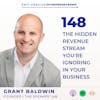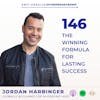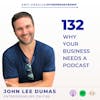Should YOU Launch a Podcast? with Ken Westgaard
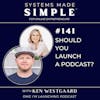
You’ve heard me talk about how to start a podcast, but in this episode, we’re digging into whether or not podcast marketing is actually right for YOU and your business. Plus, you’re getting the inside scoop on my proven podcast launch strategy!
You’ve seen lots of information floating around on how to start a podcast, but how do you know if podcast marketing is really is for you?
Maybe you’re afraid of the tech or of not coming across like an expert, OR maybe you’re afraid of wasting time on something that might not be successful.
I get it, and that’s why today, I’m sharing a recent interview I did on Ken Westgaard’s show, the OMG I’m Launching podcast, that dives deep into the perfect candidates for podcasting (and what I share may just surprise you)!
BY THE TIME YOU FINISH LISTENING, YOU’LL DISCOVER:
- How to tell if you or your business is ready for a podcast
- My proven strategy for how to start a podcast and how to launch it — something I rarely teach outside of private workshops
- What you need to do if you want to be truly successful at podcast marketing
_____________
Liked this episode? Pay it forward and share it with a friend.
Love the show? Write a 5-star review — even one sentence helps us keep bringing you the content you want to hear.
More from Courtney:
- Website: theeffortlesslife.co
- Instagram: @thecourtneyelmer
Some product links on this site are affiliate links, which means we'll earn a small commission for any affiliate purchases you make (at no additional cost to you). We only recommend products that we use and/or personally trust, so you can browse with confidence.
All Rights Reserved | © The EffortLESS Life®
Courtney Elmer 0:00
Welcome back, you're listening to the AntiFragile Entrepreneurship™ Podcast. This is episode 141.
[INTRO]
Not that long ago, I was interviewed on the OMG I'm launching podcast by my good friend, Ken Westgard. Inside this episode I'm going to share who is a perfect candidate for launching a podcast, as well as who shouldn't launch a podcast and what you need to do if you want to be successful at podcasting, and how to tell if your business is ready to start a podcast. Let's roll the tape on that interview.
Ken Westgaard 3:25
Today, I have Courtney Elmer with me and Courtney Elmer has been on this podcast once before. So welcome back, Courtney Elmer.
Courtney Elmer 3:31
It's exciting to be back to talk about starting a podcast.
Ken Westgaard 3:44
It's been almost a couple of years since last time. And it's great to have you back Courtney Elmer. Give us a quick introduction of who you are, who you help and how you help them with starting a podcast. And last time you were here was right after you were starting a podcast of your own. How has that journey been for you?
Courtney Elmer 5:58
[Courtney Elmer shares her bio and starting a podcast journey]
Courtney Elmer 10:44
I believe that everyone has a message worth hearing and should start a podcast. Sometimes that message is covered up with a lot of noise. And sometimes the noise is a lot of the noise, we're telling ourselves as to why people won't listen, or why it's not worth talking about or sharing or our story doesn't amount to much, or whatever that we're telling ourselves. Everyone has a message. And that message is someone out there is waiting to hear. Yeah, they need to hear it, and they're only going to receive it from you. So I believe that to my core, and to me, starting a podcast being able to utilize this amazing tool, both to help reach the people who need your message and leverage it for business, because that's a nice little bonus when you can get sales and leads flow from it right.
Courtney Elmer
I'm very much a big part of like leverage and strategy when it comes to business. So to me, it's such a powerful platform to start a podcast. And it's something that I've like stumbled upon and so passionate about, I surprised myself with how much I really love podcasting, like geeking out on helping people start a podcast. it really is so powerful. And I don't know, that's really the evolution of you know, from then to now. And now. That's what we do we help with starting a podcast.
Ken Westgaard 12:08
It sounds so great to hear you say that, Courtney Elmer. The message needs to be heard. There's always someone out there who is dying to hear that there's someone else, you know, struggling with the same things or have a solution for that problem, whatever it might be. So start a podcast! Some people will have 50 downloads one week and other will have 10,000 downloads, but doesn't matter, because it's your message is getting out there is reaching someone.
Courtney Elmer 13:04
It's powerful. And you know, what I like to think about too, in terms of starting a podcast, but I think a lot of people haven't thought of starting a podcast in this way. But back in, when I was first building my business, my son, who's now four was an infant at the time. I mean, he was little, and sometimes the only time that I would get a break in the day would be to like, strap him in the stroller and say, Okay, we're going for a walk, I don't know how long we would be or how many miles we would walk that day. But we would go and we'd walk for miles. And during that time, you know, he'd be munching on his snacks or whatever. And I'd be listening to podcasts the entire way. And learning as much as I could about business trying to find all the shortcuts that we're always looking for, you know, okay, how can I do this better? How can I grow faster? How can we generate more leads, more sales, all the things we need to keep our business going?
Courtney Elmer
And it clicked for me one day. And the things that have happened in my business that have happened because of starting a podcast that would have and could have never happened, had I not had started a podcast. So that from that perspective, too, it's been really interesting to see how starting a podcast can be such a powerful tool for business. Because I think so often in business, we get stuck on this idea of what we think we should be doing. Oh, yeah. Because someone else has told us well, you have to be on social media. I mean, if you want to grow, you got to show up every day and point to random stuff on the screen and dance and, you know, do lip syncs. It's like, wait a second, I didn't get into business to do this, like, Why am I always undoing this.
Courtney Elmer 17:49
And when we can get to the point in your business where we recognize, you know, what, I am willing to let go of the things that are not working for me. I'm not going to continue pouring my resources, my limited resources, time, energy, mental health, not even mentioning money, All of these limited resources into something that's not working. And by freeing up that time, and allowing yourself to explore other options can be I mean, the possibilities that it can open for you are really incredible. And so that's what starting a podcast was, for me, that's what it did for me, you know, in my own business.
Ken Westgaard 18:57
It's great to see that you found like your thing (starting a podcast) and you went with it Courtney Elmer.
Courtney Elmer 19:37
I think that's so true in all aspects of our business so right like when we are really connected with what it is we're doing. It's something this is really goes back to our what the whole platform that my company is built on this idea of effortless because people will push back on me and they'll say will coordinate business you have to work cannot work right. I'm like yes, I didn't say work less. I said effort less. And really the the whole meaning behind that for me is this idea that when you are doing what you love, you're using your gifts, you're using your talents, you're in that flow state No, everyone's listening has had an experience of what that's like, even if it was a little glimpse of being in that state where time passes and you had no idea it was even going by and you're so connected to what you're doing, that it doesn't feel like work. It's effortless. It's enjoyable, and that I deeply believe is how business should be
Ken Westgaard 20:40
You mentioned earlier, well, at the time, starting a podcast wasn't a formula. But now it is. Would you mind briefly going over that what that starting a podcast formula looks like and how people can use it for themselves Courtney Elmer?
Courtney Elmer 20:55
Yeah, absolutely. So the way that I teach starting a podcast is really different from what you'll find in most podcast courses out there. It's also different than what you might Google when you type in starting a podcast. And if you were to do that, which I encourage you go to Google type starting a podcast and see what comes up, it's gonna give you millions of hits in a matter of seconds, with far more information than you would ever ever wish to consume about starting a podcast. When I teach about starting a podcast, I'm going to give you a system. I will show you the three parts which we'll walk through in a moment, but I'll give you the overview to create, to launch and to leverage or grow and monetize your podcast. So those are the three elements.
Courtney Elmer 25:03
But what you do within that framework, or that system or that formula, whatever you want to label, it truly is yours to be able to utilize and create this beautiful artistic masterpiece, which is your podcast, your message, the people you want to reach. And so this is what's been amazing to me is that every time I teach this starting a podcast formula, even though it's the same steps, it's the same lines, the picture is always different. Yeah. And so we have helped so many business owners from all different backgrounds, all different messages, all different walks of life, reaching all different kinds of people, to create these beautiful works of art in the form of starting a podcast by using this very simple formula, create, launch and leverage.
Courtney Elmer
So really, the three pieces of those formula, this formula breaks down into the three elements of a truly profitable podcast, if you're missing any one of these elements, your show's not going to be as successful as it could be, you might have some success, you might have success and fits and starts, and maybe you see a lot of ups and downs in terms of downloads and things like that. But it would, it's not going to be as successful as it could be if you are missing any one of these ingredients. The problem with most of the information out there today on podcasting is that they have the Create piece down pat, you can type in what kind of podcasts microphone to buy and get hundreds of recommendations, you know, and how to create it, what kind of cover art, what should you name it, right, you can find resources on that.
Courtney Elmer
But knowing how to pull it all together for your unique show with your unique message is can can be challenging. And then on the back end of that, you know, a lot of people out there talking about starting a podcast and how to monetize a show you know, and how to get a return from starting a podcast And that's important too. But unless you have the right positioning, and a solid name, and solid messaging that's going to attract your ideal person, there's no point focusing on trying to grow or monetize because you won't have any people to grow or monetize it with. And then the middle piece, the launch piece, this is the piece that boggles my mind. But most people totally skip over this part. And they say go hit publish, get your episodes out there start.
Courtney Elmer
What happens is, most people will do that. And then they'll stop after Episode Six, because they didn't start a podcast properly. They didn't get the eyeballs on it in the beginning that it needs in order to really gain traction. And it feels like a slow slog to try to grow a podcast, that most people get discouraged and give up altogether and think it's a waste of time. So you have to have all three of these ingredients to really be able to succeed in the world of podcasting because with the Create piece, not only are you learning how to position your podcast, so you can reach your ideal person who needs your message and where to find them, and how to reach them with your show and the angle and topics of your show. Then launching it is going to actually help you get it in front of those people. And then when you do that, you'll be able to build traction quickly. This is the piece that is missing for so many people because starting a podcast really is a long game.
Courtney Elmer
But it's much longer when you don't watch it because that's really that's it helps you grow so much faster. And we could go down a whole rabbit hole there. But I'll leave it at that for now. And then by the time you've started a podcast, you've seen those reviews coming in, you're getting your first few hundreds or 1000s of downloads, that's exciting. It gives you the motivation to keep going. And you're like okay, people are resonating with this. People want what I have to say this has been fun for me. And then you can shift gears and start to look at now how can we really leverage the heck out of this and utilize it to build relationships to create connections to generate leads and to monetize both?
Courtney Elmer
Monetizing through traditional means like advertising and sponsors and terms like that, that you hear podcasters throw around. And also if you're a business owner, to send people directly to your courses and programs or your membership, and monetize with your own stuff and driving traffic into what it is you already offer. So those are the three elements. I'm happy to go as deep as you want. I don't know how much time we have. I could talk about this stuff all day. But that's a broad brush overview.
Ken Westgaard 29:45
There's probably a few people who's listening right now and they may have already started a podcast so they arent starting a podcast from scratch. Courtney Elmer, how would that work for those who already started a podcast and have had a podcast for maybe couple of years?
Courtney Elmer 30:08
Yeah, this is a great question. This is not a question I always am asked. So I'm really glad that you bring this up. I'm sure there's people listening, who have started a podcast and then pitch it the second thought that follows that is like, is it too late for me? You know, I've already been podcasting. I had someone reached out to me a couple of weeks back, she said, Courtney Elmer, I know you say most podcasters stop after Episode Six. I'm 54 episodes in. I didn't launch it. I didn't do any of the things you said to do. Can you still save me? And my answer was? Yes. Can you save me? Is it too late for me? In fact, you are in a better position than someone who has never produced a single episode and is just starting a podcast for the first time.
Courtney Elmer
Because with the way the launch process works when starting a podcast, it's got a couple of elements to it. One is utilizing your existing community to support your podcast, whether you're starting a podcast for the first time, or whether you're relaunching after already starting a podcast previously. Maybe you're wanting to relaunch it, maybe you're rebranding, maybe you're celebrating an anniversary, and want to do something big to generate awareness and buzz about the show. And by starting a podcast with an existing, we'll call it a bank of episodes, you're also going to increase your downloads that you get on launch day. So when I'm teaching about starting a podcast, I'm always recommending to our students.
Courtney Elmer
You want to be starting a podcast with a minimum of minimum five episodes 10 would be better 100 would be better. Now, the real reality of someone go record 100 episodes when starting a podcast was probably not that realistic, unless you're planning for like a year, and then you launched the 100 episodes. But the more episodes you have, when you launch, the better your chances of ranking. And the more downloads you'll be able to get, which of course directly impact your ability to rank depending on how competitive your category is without getting into all the technical aspects.
Courtney Elmer
So if you're a podcaster whos started a podcast previously and has been podcasting for three 610 12 months or more, and maybe your show hasn't gained the traction, maybe you didn't launch it, maybe it took you a while to kind of find your rhythm. Maybe your branding needs a little sprucing up in terms of who you're targeting, how you're targeting them with your show. And you relaunch it, and you're able to relaunch with all those episodes that you already have plus maybe a few more to celebrate the launch, you are going to see a tremendous increase in your traction and in your downloads.
Courtney Elmer
And it's really powerful, because a couple of reasons. Number one, if you were to do what most people do, and hit publish when starting a podcast on one ep, then you're starting at the same level, or the same playing field as everybody else. Now, when you're going up against podcasters, out there who've had shows for years, and they're in the top and they hold the top spots in that category, and you're trying to make an entrance, but you're doing the same thing that everybody else is doing, then you're competing with everybody else who's hitting publish on the same day as you. But when you have a really strategic launch plan, not a complicated launch plan, but a strategic launch plan, where you take a few steps and lay a little bit of groundwork first, before hitting publish, you'll be able to drive more traffic to your show on launch day.
Ken Westgaard 34:17
I know people have said you shouldn't spend money on ads because that's useless, you know you're gonna get traffic so what's the point. But you also mentioned that, you can leverage your podcast and you can actually get leads and get people to sign up for whatever they say you offering. So what's your standpoint on doing that Courtney Elmer?
Courtney Elmer 34:48
Yeah, there's a lot of ways to look at it. So first would be having other people advertise on your show Oh, and pays you money to get in front of your audience ships, which is one way to monetize sponsorships advertising. So you can build that listener base quickly and monetize sooner. For a lot of people, getting advertisers or getting sponsors on their show doesn't come until later. At the same time, I tell people don't look at that, you know, the downside, like, Oh, they're not gonna pay attention to me, because I'm not big enough yet. No, build with what you have.
Courtney Elmer
On the other side of advertising, there's advertising your show to get more eyeballs on your show. The way that I like to advertise is strictly organic. And there are some platforms out there that can help you do this. One of those platforms is called AudreyAI. What you can then begin to do is connect and collaborate with other podcast hosts and do something called a trailer swap, where they're promoting your podcast to their audience. And you're giving them a shout out on your show, to promote their podcast and kind of draw, cross promote and drive traffic that way.
Courtney Elmer
That's really honestly a very underrated and potentially very effective tool. Because think about it, if you're a host on a show, and your audience knows you, they like you, they trust you. They're going to trust whatever recommendations you have. So when you create a quality relationship with another podcast host, you're not doing this with anybody and everybody you're trying to find those hosts that really have an aligned audience with yours. You like their show you'd like the hosts, you'd like what they're about. And you make the recommendation on your show to say, hey, you need to go check out this podcast.
Courtney Elmer
In fact, they did this the other day. I said, there's a podcast. That is fantastic. If you want to go listen to and learn about business mindset. And whatever it was about this podcast, I said, go check it out. Now my listeners are going to trust my recommendation. So if there's someone that already listens to podcasts, and they're looking for other podcasts to listen to, chances are they're going to go find that podcast and vice versa. So that can be very effective.
Courtney Elmer 39:22
Another tool is to be a guest on other podcasts. Like me sharing about podcasting here on your show right now I'm launching a podcast and what that's all about. I have a podcast where we talk about systems and marketing and podcasting and all kinds of things as it relates to business and business systems. But for a long time as a podcast host I was so focused on my own show and being the host that I forgot about being a guest and that is one of the most effective ways to get people to your show as well and essentially advertise your show. Because if someone's listening right now to this podcast, and they hear me on this show, and they're like, Well, I want to learn more about systems or I need some help with that in my business, well, chances are, they might go check out my show, and take a look at that. And so that is a more natural and organic way to always be growing exactly when it comes to podcast.
Ken Westgaard 41:43
So what are your best tips to get on another podcast?
Courtney Elmer 41:47
Oh, I love this question. Guesting on other people's podcasts appearing as a guest can be one of the fastest ways to grow your email list, when you know how to do it right when you're not pitching willy nilly and trying to get on any and every podcast, but when you're really strategic with the podcasts that you're pitching. And when you have a very tangible plan or call to action at the end, and having some way to capture that traffic. So even if you're not a podcast host, it's also a great way not only to build your list, but also to get your feet wet with podcasting and see how it is to be a guest and, what that feels like to kind of start sharing your message in this way.
Courtney Elmer
So in that template, you know, it's funny, because as a host, which can I'm sure you get this all the time as well, having podcasting and being having been podcasting for so long, is you get a lot of pitches. And not all of them are great. And I mean, you know, I say that with so much love. But I mean, some of these pitches we get are absolutely terrible. It's like, did you even look at the show before you pitched me? You know, did you even take any time. And so, you know, I can go on for hours about what not to do.
Courtney Elmer
But when it comes to pitching really, there's four things you need to remember. The first is you want to always target the person in charge of booking guests for that show. The reason this is important is because if you send an email to the show host, but the host is not actually the person who books, the guests that host, depending on the systems they have on the back end may or may not forward your email to the person in charge of it, it might get missed, it might get deleted, because they're like, Well, I don't handle that. And they delete it. They won't even take the time to respond to you. But when you do a little bit of research and find out okay, who's actually in charge of this show? And how can I get that person's information so I can pitch them, then you're building and creating a connection with the gatekeeper. And that's who's going to either let you on the show or not. So that's the person you want to build a relationship with.
Courtney Elmer
And so I share that as an example because back in the day, I used to handle all the guests that would come onto the show and I would vet them and I would review them and I'd be the one reaching back out to them and booking them. Now I have a podcast manager who does that. And so we've gotten pitches before where they somehow find my email and they pitch me and of course I'm a nice person, so I always afford that email, I don't hit the delete button, always send it on to her. But you know, there's a chance of your message getting lost. And also, it's like, well, you know, they, they assume that I'm in charge of doing guests, when really I'm not the relationship they need to be building is with my podcast manager who is responsible for bringing guests onto the show. And I don't have the final say so in that anymore, she does. So she's the gatekeeper. So do your research.
Courtney Elmer
And this is also going to play out into when you're pitching the next step, part two, which is building a relationship with the person that you're pitching. So what I see where this goes wrong is a lot of people will do what I call copy and paste pitching, where they might change the name of the person that they're sending that pitch to, but you can tell it was a copy and paste email. And you can tell that they did not put any thought or any time into making that pitch specific for your show. And those pitches are much more likely to get deleted, because in a matter of a split second, that host is going to read that email or the person responsible is going to read that email, and they are going to feel that you don't care. Now, this is not necessarily a conscious assumption that they're making, they're not sitting there that their keyboard going, Oh, my gosh, this person doesn't care about us, they're gonna go delete, because they didn't resonate with it, you'll be lucky if you get a canned response, saying thanks. but no thanks.
Courtney Elmer 46:40
You can build that relationship by finding a few points of connection and showing that person that you took the time to maybe listen to an episode, and share what you liked best about it, maybe leave a review on that podcast and share a screenshot and say, Hey, wanted to send some love your way if you see this review come in, this was me share a couple of really kind sentences. That host is gonna go whoa, because not everybody does that. And as a podcast host, we know how much those reviews really mean on multiple levels. So that's automatically going to grab their attention. And because you made them feel something you made them feel acknowledged, you made them feel appreciated, they're going to be much more likely to read the rest of your email, which is where you will then come in with part three, as to how you can fill a content gap for that host.
Courtney Elmer
So what I mean by that is that rather than saying, here are the five topics that I talked about. And I would love to get in front of your audience and share about one of these topics like we're a podcast hosts, we know you want to get in front of our audience, and we know your end game is okay, there's no fooling us. But when you can position those areas of your expertise and show me how that's going to benefit my audience, because either it's not something I've talked about on the show before, or it's not something that's been talked about for a while on the show. Or maybe it's an angle that hasn't been explored before, that's going to feel a need that I have. And I'm going to naturally want you to come in and solve that problem for me that you've illuminated for me, which is that, hey, you have this content gap. You don't necessarily say that.
Courtney Elmer
at this point, all you need to simply ask is, are you interested? That's the ask. You're looking for a yes. That's it. You're not really looking to secure the booking, right that that will come later if the person is interested. That's all you have to do. And you would be amazed at how better receive your pitches are, when you follow that simple format.
Ken Westgaard 51:25
We could probably talk about starting a podcast, Courtney Elmer for a couple of hours. But yeah, we need to keep it short. I want to say thank you Courtney Elmer once again for coming on the show talking even more about starting a podcast and launching. I mean, no, we did that the first time. But this cemented the whole idea of starting a podcast. So yeah, I love that. So thank you so much Courtney Elmer.
Courtney Elmer 54:17
Join me back here next Tuesday. Until then, go live your EffortLESS Life®.




